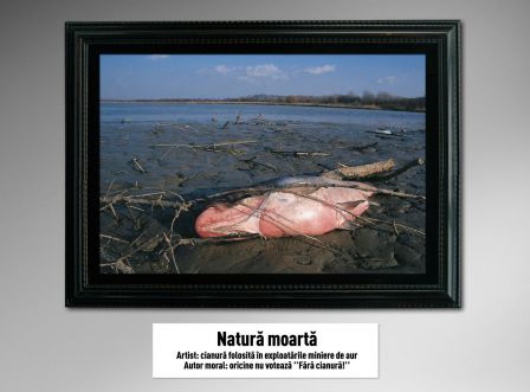WOULD YOU CARE FOR SOME CYANIDE?
Published on
A. If the answer is YES: the product - to be stored in the ambient air, drinking-water or food - could soon become available for distribution on the Romanian market. It is expected that the offer will atipically exceed the demand, causing providers to deliver HCN compounds en gros and en detail, at the mere price of accidental exposure.
B.
If the answer is NO: you can support the legal initiative to ban cyanide use in the mining industry at: http://www.faracianura.ro/vot.php.
The „Coalition for a Cyanide Free Romania” was initiated by several national as well as international environmental NGO’s. Civil society representatives developed this informative campaign aimed at supplying members of parliament with essential data prior to reaching a decision on the ban of cyanide use in mining. Initially drafted as a joint project by UDMR (The Democratic Hungarian Union in Romania) and PRM (Great Romania Party) alltogether, the Legislative proposal to extend article no. 4 of the Mining Law no. 85/2003 will be submitted to the vote of Romanian MP’s between December 15 and December 20.
Currently, no cases of cyanide use in the mining industry can be reported in Romania. The law proposal whatsoever aims at setting a national legal framework able to prevent environmental catastrophies from becoming recurrent in future. International opinion has portioned the effects of the ecological disaster at Baia Mare into a regular percentage which Romanian contributors have not finished delivering yet. Damage caused to the Hungarian side through cyanide discharge in the Tisa River is being payed by the Romanian state alone, since the Australian Mining Company „Esmeralda” went bankrupt straightaway. Consequently, as long as weaknesses in legislation are not rigurously addressed, similar events remain likely to occur.

Concerns center around the specific cyanide based exploitation proposed by the Canadian Mining Company „Rosia Montana Gold Corporation”. The prospected area to be melted comprises four villages situated in the Alba County. Out of these, Rosia Montana clearly stands out, having an unique archaeological heritage (Roman galleries), utmost diversity of flora and a multicultural community, already eroded. Against all security measures, potential accidents are likely to trigger cross-border consequences directly proportional with the dimensions of the project, which outweighs by far the above mentioned Baia Mare. The Romanian state will –again!- be made accountable by affected neighbours if RMGC follows the profit pattern by withdrawing in bankrupcy.
Furthermore, indirect effects upon human health go beyond common power of estimation, when it takes 20 tones of waste to manufacture one single golden ring. Complying with the environmental norms in order to avoid any short term health risks implies monitoring for only three categories of cyanide: free cyanide, weak-acid-dissociable (WAD) cyanide, and total cyanide, required by regulators. It does not imply monitoring other compounds nor preventing medium and long term effects. Among the states which, through power of precedent or example, have regulated the use of cyanides in the mining industry by banning it, we currently acknowledge Montana, Colorado, Wisconsin, Turkey, Honduras, Costa Rica, Peru, Philippines and Argentina. Inside the European Union, policies in this regard belong to the national sphere of reglementation. Germany, the Czech Republic and Greece have hitherto passed laws securing citzens’ protection relating exposure to cyanide by banning it.



